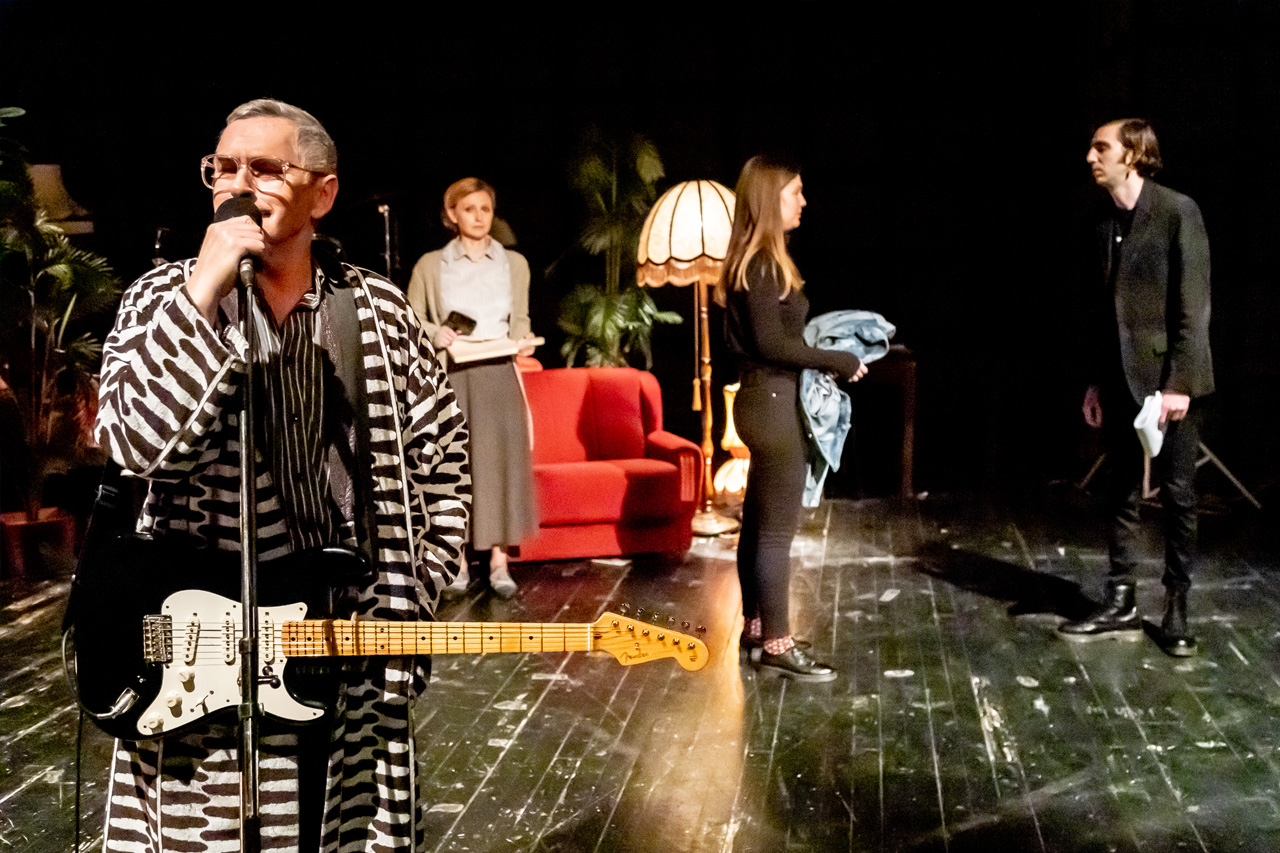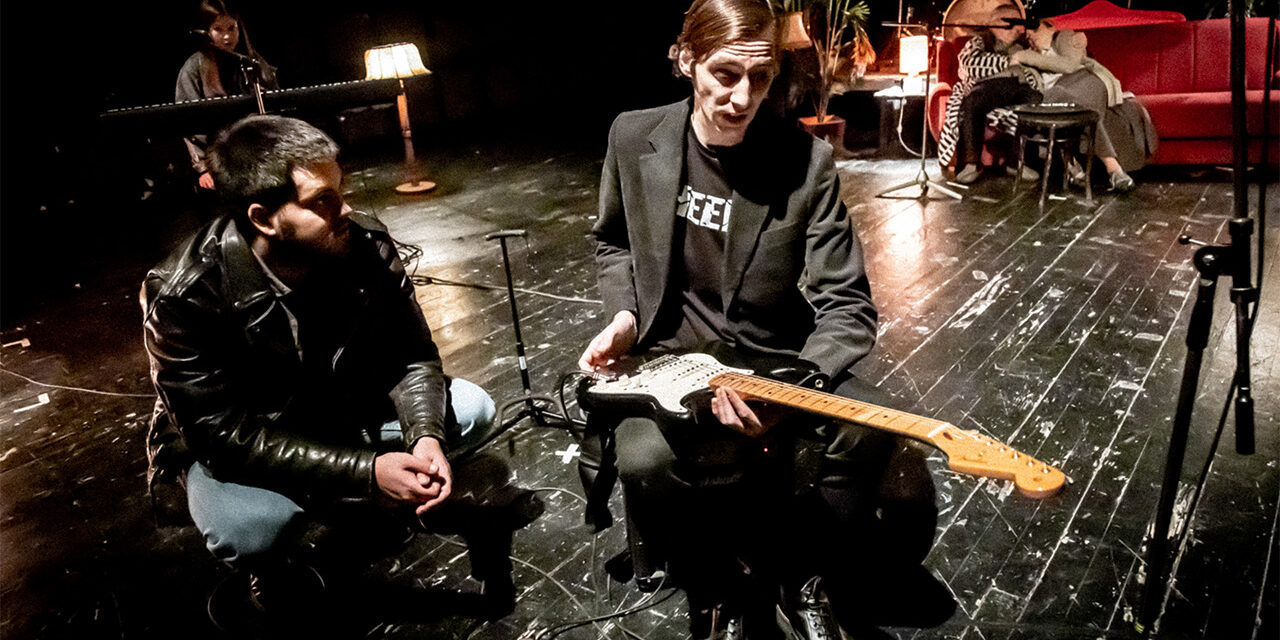Serbian National Theatre, Novi Sad
The year 2020 brought the so-called new normal into our lives – and into our theatres. One of the novelties it brought with it that should have always been normal was the opportunity for young directors who studied at the Academy of Arts in Novi Sad to stage works by local writers in the institutional theatre in Novi Sad. Although logical, this does not happen often. Time will tell whether this practice is a on-off and the doors of institutions will again be closed to young artists, or if this opportunity will turn into continuous support.
The Novi Sad Omnibus, a trilogy produced by the Serbian National Theatre in 2020, brought together three young directors (Ivana Janošev, David Alić, and Dušan Mamula) who staged plays based on the prose of three writers from Novi Sad (Slobodan Tišma, Franja Petrinović, and Đorđe Pisarev).
The first segment of the omnibus is Pojačalo i gitara (Amp and Guitar), dramatized and directed by Ivana Janošev. It is based on the story of the same name by Slobodan Tišma from his collection of auto-fiction stories Urvidek about the fates of marginalized artists in Novi Sad in the mid-twentieth century.
Let’s dig some more into the context: Slobodan Tišma is a prose writer and musician whose two rock bands, La Strada and Luna, had a significant impact on New Wave Rock, and one of the key figures of Novi Sad and Yugoslav avant-garde. In the early ’70s, he and a group of like-minded individuals usurped the Youth Tribune, part of the public institution of the Cultural Center of Novi Sad, and turned it into a kind of urban commune. Soon the state expelled them from the space, but the influence that Tišma had on the development of the new wave could not easily vanish. In short: one of the remaining living Dadaists, or as he describes himself, a conservative avant-garde.
Director Ivana Janošev, a millennial herself, chose the story Pojačalo i gitara where the Nameless Hero, a 36-year-old man (played by Jovan Živanović, who was also the musical collaborator), orders a guitar and amplifier from the Friend in London (Fedor Đorović) to pursue music. He has no grand dreams of fame and fortune, nor does he possess great musical talent. Nameless has nothing else to do as a political dissident and social outcast. At one point, he forms a band with the Girl (brilliantly played by Anđela Pećinar) and later the Friend. After several gigs, the band breaks up due to the Nameless Hero’s fears.
During the dramatization, the director focused on the relationship between the parents (Miroslav Fabri and Sanja Mikitišin), particularly between the dissatisfied, narcissistic father diagnosed with lung cancer, and his son Nameless, avoiding the trap of a sentimental illustration of a past time. Thus, although the play retains the temporal and local framework from the original story, it manages to rise to a universal level.
In light of this year’s Oscars and the triumph of the film Everything Everywhere All at Once, a lot has been written about the tendency of millennials to create stories in which parents, burdened by difficult life circumstances, realize the mistakes they have passed down to their children and apologize for the emotional scars they have caused, and their children forgive them. In the play Pojačalo i gitara the father does not apologize to his son even when faced with a fatal diagnosis, as a reflection of the world in which Tišma grew up. However, by changing the end from the original text, Janošev managed to continue the narrative of her generation by having the protagonist forgive his parents at the very end.

Amp and Guitar
The director skilfully breaks the fourth wall several times, where Nameless speaks to the audience directly, expressing his emotions. In addition, there are many thoughtful directorial techniques and utilized potentials, such as using microphones and a guitar on a stage. However, the episodic character of the Guy from the club (Vukašin Ranđelović), who appears only once so that the protagonist can tell someone that he is looking for musicians for his band, could perhaps have been used more efficiently and economically.
In terms of directing, the division of space into three parts (set design by Andrej Rondović) is interesting – the area of the older generation, a couch where passive parents sit, and where the dissatisfied father complains to his son about how untalented he is, how disappointed he is, how much he blames him and hates him; the central space where the present takes place, where Nameless and the Girl create music; and the space on the same level as the audience where the Friend is, who writes from distant countries where not everything is great but possibilities are visible, and where Nameless will never set foot.
Music plays a significant role both in Tišma’s life and in the story and play. The performance of La Strada’s music is one of the most exciting segments of the play. Nameless performed at Studio M, where La Strada and others recorded an album in the late ’80s. Studio M in Novi Sad was the victim of the title of European Capital of Culture. Therefore, this play is important as a warning that by eliminating significant spaces or changing their purpose, we are taking away the possibility from present and future generations to create authentic art and develop an independent scene (such as Youth Tribune for Tišma).
The play Pojačalo i gitara could have incorporated Tišma’s works and thoughts to a greater extent or branched out the chosen story, instead of just sketching one character, but it captured the passive, sluggish, slow spirit of the city, the generational gap, and offered a fresh, contemporary twist at the end. It created a true Tišma’s hero – “a rebel who is insensitive because he cannot love what he sacrifices or allow himself to miss what he leaves behind,” as described by Vladislava Gordić Petković in the foreword to the book.
As someone who was born in Novi Sad, I must also add that it is of great value to the local community to have the opportunity to reflect on their city. All of the above is enough to set the practice of young artists doing theatre in their town as normal and open the doors of an institutional theatre for them.
For tickets and further information, visit: snp.org.uk
Divna Stojanov is a dramaturg and playwright. She writes mainly for children and young people.








